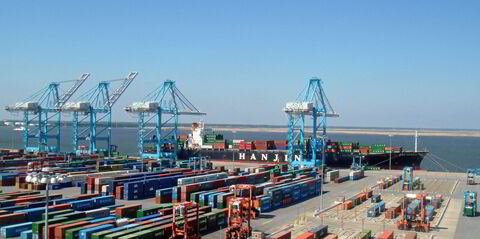The incidents all took place in the eastbound lane of the traffic separation scheme between 02:30 on 21 August and 05:35 on 22 August.
The ships involved were the suezmax Advantage Summer (built 2010), the 30,040-dwt tanker Navig8 Stealth SV (built 2008), the 37,383-dwt tanker Elbtank Denmark (built 2002), the panamax bulker Peace Bright (built 2013), the 7,450-teu Maersk Lebu (built 2011) and the 1,702-teu Atout (built 2010).
Maersk Line said four suspected thieves boarded the Maersk Lebu at 04.15 local time.
"The presence of the suspected thieves was discovered when a door alarm went off.
"The vessel sounded the whistle and general alarm. The suspected thieves were sighted by a search group as they were leaving the vessel at the aft," it added.
No seafarers on the Maersk Lebu were hurt and damage was limited to some broken padlocks and a missing life vest.
It was the first time in recent years that a Maersk vessel has been subject to a robbery attempt in this area, Maersk said.
Details of the other attacks came from Singapore-based Regional Cooperation Agreement on Combating Piracy and Armed Robbery against Ships in -Asia (ReCAAP) Information Sharing Centre.
"Considering the close interval of time and proximity of these incidents, the perpetrators could possibly be from the same group," ReCAAP said in a statement.
"From the description of the incidents, the perpetrators operated in about 4-5 persons, armed with knives and were opportunistic in nature without targeting specific vessels.
"They aborted boarding when crew was alerted, and escaped empty-handed when the alarm was raised without harming the crew.
"Of concern was their persistence in 'hovering' in the vicinity seeking out their next target."
ReCAAP said it commends the masters of the six vessels for reporting to the Singapore VTIS who issued the navigational broadcast to mariners, and notified the enforcement agencies.
However, it urged a "collective effort by all stakeholders" to do their part towards eradicating such incidents at sea; including timely deployment of patrol vessels by the relevant littoral states and increase its surveillance in the vicinity.
"From the incidents, enhanced vigilance, early detection of suspicious perpetrators and activation of the alarm immediately are key actions towards preventing boarding," it added.



